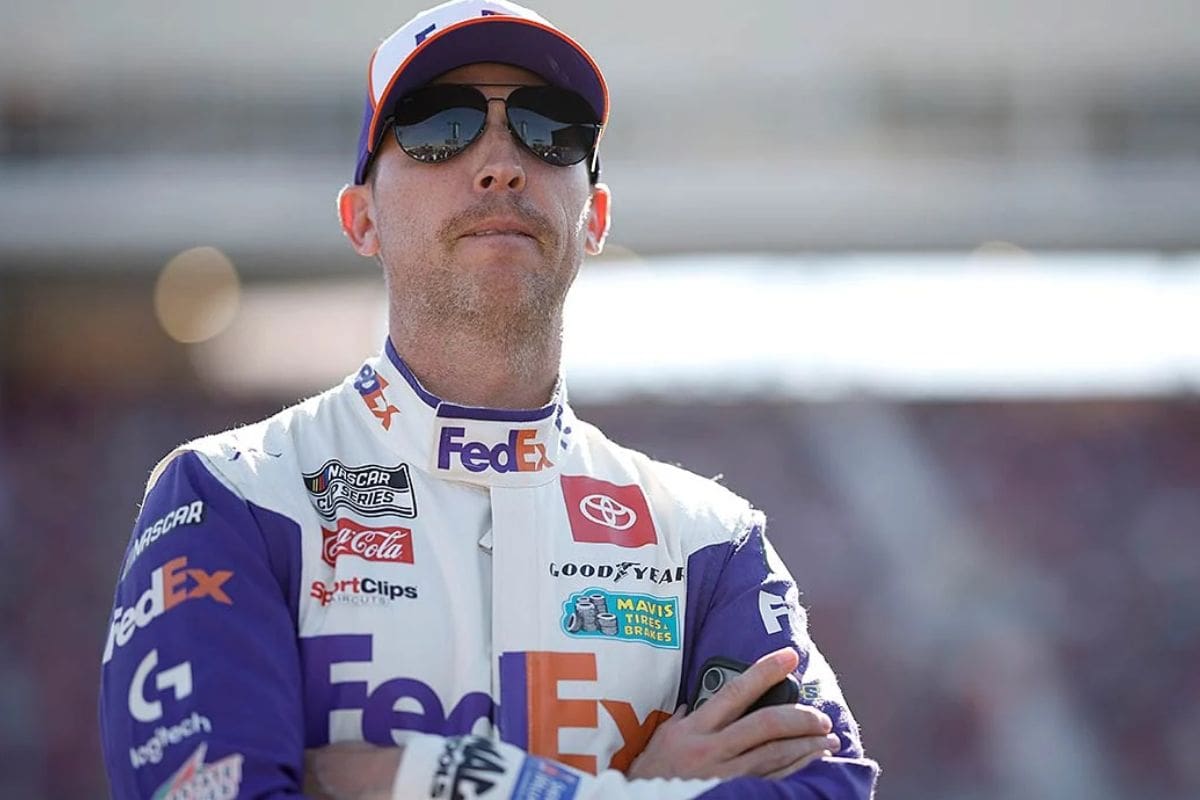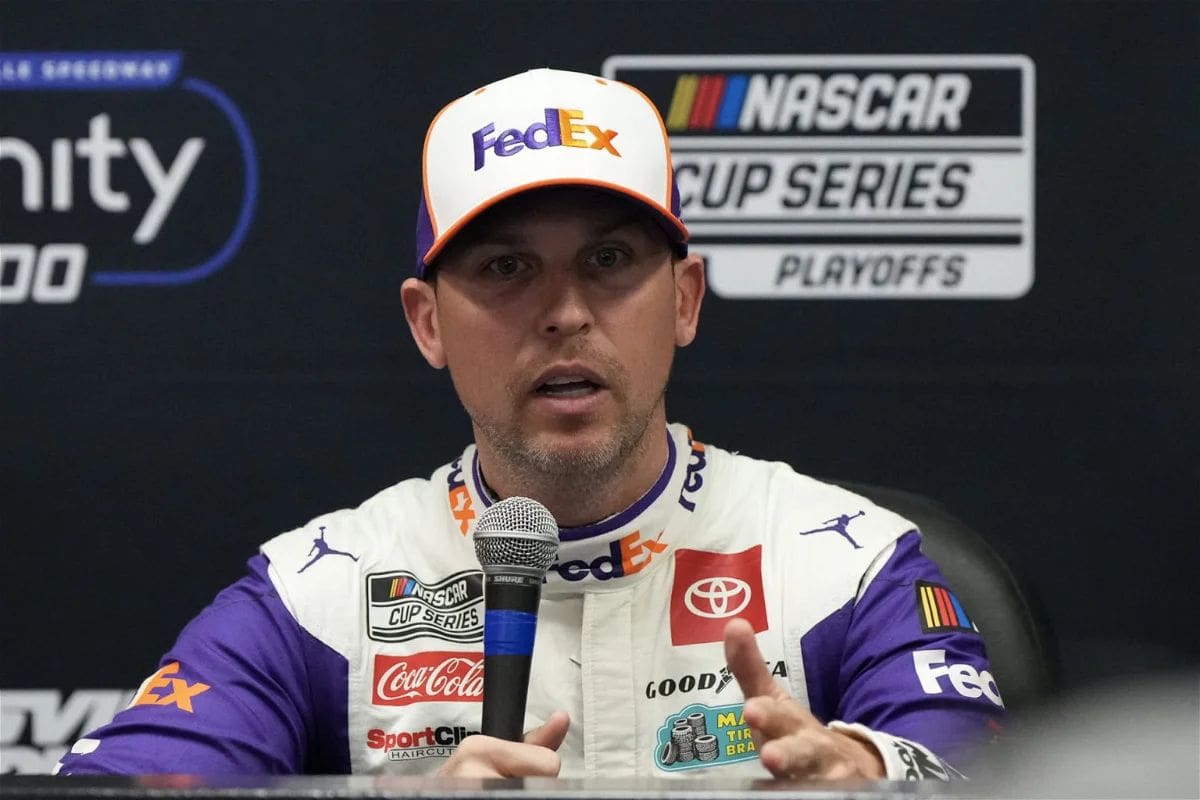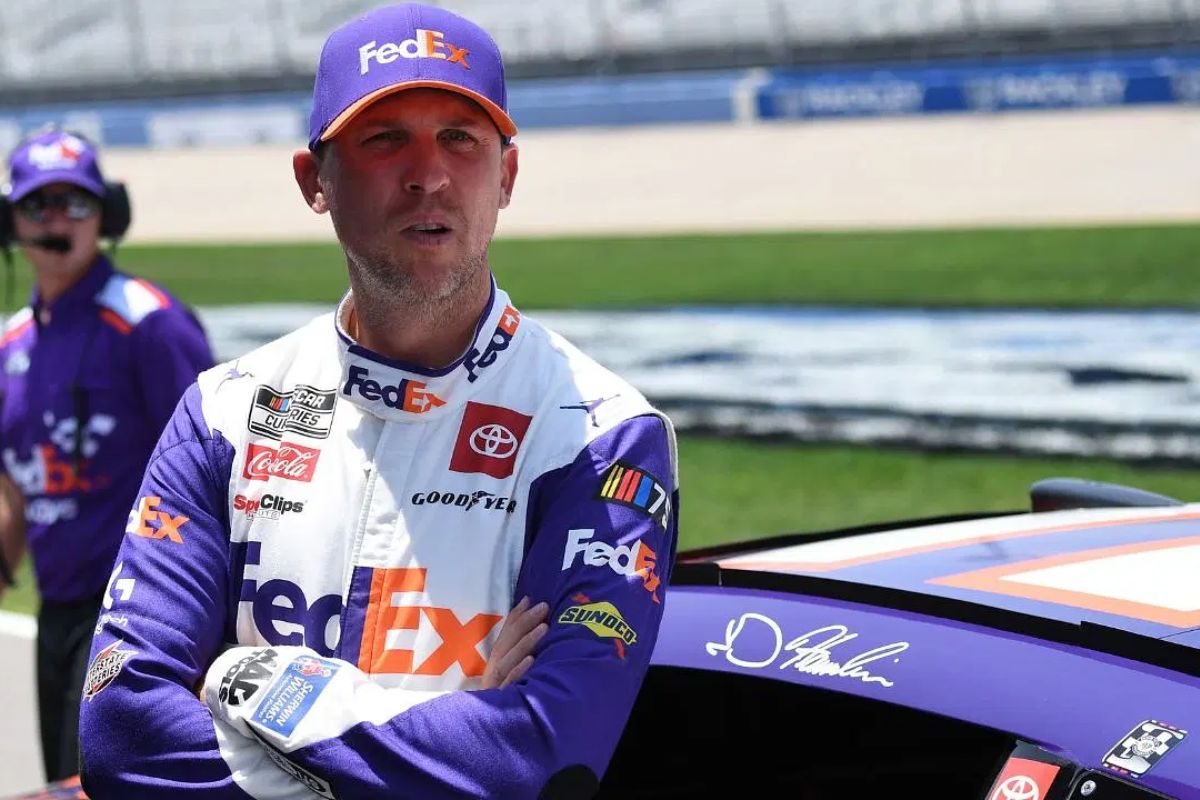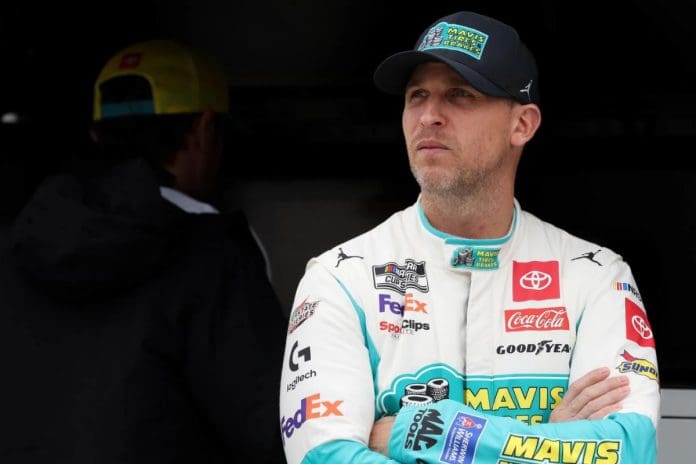Denny Hamlin Questions NASCAR: Denny Hamlin’s recent expressions of doubt regarding NASCAR’s latest experimental changes, such as the tire modifications at Darlington and the adjustments to the short-track package, underscore a broader discourse on the balance between innovation and tradition in motorsports. His call for increased horsepower and improvements in aerodynamics and tire technology points to a deeper concern about maintaining the competitive integrity and spectator appeal of NASCAR.
Key Takeaways
- Denny Hamlin expresses skepticism about NASCAR’s new tire changes and their effectiveness at Darlington.
- He doubts the impact of the short-track package and suggests more horsepower is needed for competitive racing.
- Hamlin emphasizes the need for advancements in aerodynamics and tire research to improve race conditions.
- His critique aims to influence NASCAR’s approach to innovation and the evolution of racing dynamics.
- Hamlin advocates for changes that highlight driver skill and strategy, over mere technological enhancements.
Denny Hamlin’s Doubts About Tire Changes at Darlington
Amid the recent adjustments at Darlington Raceway, Denny Hamlin has voiced skepticism regarding the efficacy of the new tire changes, particularly in relation to the newly implemented short-track package. As a seasoned NASCAR driver, Hamlin’s concerns highlight deeper intricacies in the dynamic between vehicle mechanics and track performance. The modifications at Darlington, primarily aimed at enhancing competitiveness and safety, include alterations to tire composition and structure, ostensibly to offer better grip and durability during races.
Hamlin’s apprehension stems from a pivotal understanding of racing physics. Tires serve as the vital interface between the car and the racetrack, dictating not just speed but also handling and stability. The specific composition and tread pattern of a tire can dramatically influence a car’s performance, especially on a track like Darlington, known for its unique shape and abrasive surface. The worry is that while the new tires might be engineered for better performance, they may not necessarily harmonize with the demands of the short-track package, potentially leading to unforeseen complications during races.
Moreover, the skepticism also points towards a broader concern about the iterative nature of such technological adjustments. Each change requires drivers to adapt their strategies and techniques, which can disrupt well-honed racing approaches. This adaptation process is not just about personal adjustment but also involves the pit crew and technical teams recalibrating their approaches to car setup and race strategy.

Hamlin’s Indifference Towards Short-Track Package
While discussing the short-track package before the race at Darlington, Denny Hamlin revealed his indifference, noting the lack of significant improvements and questioning its potential to elevate racing conditions. This stance from Hamlin adds another chapter to the ongoing debate about NASCAR’s approach to improving the competitiveness and entertainment value of races on short tracks.
“The short-track package doesn’t have enough positives to really warrant such a small spoiler on the back. I think I know why they did it, to try to get you know the cars to you know to have more downforce on the top side versus the bottom side of the car, but I just haven’t seen anything that really says that it’s better with one or the other.”
“So you know I’m indifferent on what package they run here but I think it’s good we’re running speeds where intermediates are probably the appropriate one for this track.” – hamlin
Hamlin’s perspective is particularly striking given his extensive experience and success in NASCAR racing. His comments suggest a skepticism about whether the adjustments in the short-track package are sufficiently creative or impactful to address the core challenges that have historically affected racing dynamics at such venues. It appears that Hamlin perceives these changes as somewhat superficial or inadequately grounded in a thorough understanding of the unique demands of short-track racing.
Analyzing Hamlin’s critique, it becomes evident that his indifference might stem from a deeper concern about the strategic direction NASCAR is taking with these technical modifications. The essence of his apprehension seems to be centered not merely on the specific changes in the short-track package, but on a broader questioning of whether these alterations can truly improve the race day experience for drivers and fans alike.
The Need for Aero Advancements and Tire Research
Expanding on Denny Hamlin’s skepticism about NASCAR’s short-track package, it is important to explore further into the necessity for aero advancements and tire research to tackle the persistent issues with air-blocking and race consistency. The recurring defensive driving techniques, primarily due to air-blocking, underlines the need for more effective aerodynamic configurations. These configurations should ideally minimize the aerodynamic wake that hampers following vehicles, thereby enhancing the capacity for overtaking and competitive racing.
Aero advancements in NASCAR are not only about enhancing speed but improving the quality of racing by reducing the dependency on clean air. Current aerodynamic packages need to be re-evaluated to facilitate closer racing without the significant loss of performance that drivers currently experience in dirty air. This involves intricate research into airflow dynamics not only around individual cars but also in a clustered racing environment.
In addition to aero advancements, tire research is equally important. Tires that provide consistent performance over longer periods can greatly impact race strategies and outcomes. The variability in tire behavior can lead to inconsistencies in race conditions, affecting the overall competitiveness and spectator experience. Advanced tire compositions and structures that adapt better to varying track conditions and aerodynamic stresses will ensure a more level playing field, allowing driver skill and team strategy to shine through more prominently.

Advocating for Increase in Horsepower
Denny Hamlin argues that boosting horsepower could significantly enrich the competitiveness and diversity within the NASCAR Cup Series races. He posits that the current levels of parity, while fostering a seemingly level playing field, might be diluting the distinctive challenge that historically set apart premier motorsports. Hamlin’s perspective suggests that increasing horsepower would not only escalate the sheer excitement of races but also refine the skill set required to excel, thereby distinguishing more definitively between the good and the great drivers.
More horsepower, he implies, would reintroduce a higher degree of difficulty in handling the cars, particularly at high speeds and on complex circuits. This would necessitate a more pronounced display of driving prowess and strategic acumen, potentially leading to a more dynamic and unpredictable race outcome. The essence of his argument is that increased horsepower could serve as a catalyst for enhancing the ‘racing product’—a term often used to describe the overall appeal and excitement of the race events from a spectator’s perspective.
Analytically, this move could also impact the technical composition of the teams. With higher horsepower, teams would be compelled to innovate more aggressively in areas such as aerodynamics, tire durability, and fuel efficiency. Such a shift could lead to a technological renaissance in NASCAR, pushing engineers and designers to their creative limits and beyond. This, in turn, could stimulate further interest and investment in the sport, potentially expanding its fan base and financial viability.
Hopes for Darlington’s Racing Product
Building on the theme of enhancing NASCAR’s racing spectacle, enthusiasts eagerly anticipate the upcoming modifications at Darlington Raceway, hoping they contribute positively to the race’s quality and excitement. As the track gears up for its 2024 NASCAR Cup Series debut, the racing community is excitedly discussing expectations of a “return to classic racing,” where skill and strategy triumph over technological hindrances like excessive air-blocking.
“It just doesn’t look good for our sport. It takes away from the racing side.” –Ryan Blaney
The primary hope lies in experiencing a race where drivers can maneuver with greater ease and less aerodynamic disturbance, fostering more overtaking opportunities and competitive racing. The changes are seen as a potential turning point that could reshape the racing dynamics at Darlington, known for its unique shape and challenging corners.
The focus is on creating conditions that allow drivers to showcase their skills and strategies, rather than being overly reliant on car specifications. This shift is expected to not only improve the spectacle for fans but also to challenge the drivers in new and exciting ways, potentially setting a new standard for races at Darlington Raceway and beyond.

News in Brief: Denny Hamlin Questions NASCAR
Denny Hamlin’s reservations about NASCAR’s experimental strategies, particularly regarding tire modifications at Darlington and the short-track package, highlight an important debate within the sport about balancing innovation with tradition.
His advocacy for enhanced horsepower and more rigorous aero and tire research underscores the necessity for strategic advancements that do not only aim for increased competitiveness but also preserve the core excitement and authenticity of NASCAR racing, ensuring it remains appealing and true to its roots.
Our Reader’s Queries
Q: What did Denny Hamlin do in NASCAR?
A: Denny Hamlin commands the No. 11 Toyota under Joe Gibbs Racing’s banner while co-owning 23XI Racing alongside NBA icon Michael Jordan in the NASCAR Cup Series. His illustrious career boasts 54 victories, highlighted by prestigious wins at the Coca-Cola 600 (2022), Daytona 500 (2016, 2019, 2020), and Southern 500 (2010, 2017, 2021).
Q: How many races has Denny Hamlin won in 2024?
A: In a remarkable feat, just one week ago, Hamlin clinched victory at Dover Motor Speedway, marking his third triumph of the 2024 season. Notably, this victory came mere days after boldly forecasting success on his podcast, “Actions Detrimental,” showcasing Hamlin’s uncanny ability to turn words into action on the track.
Also Read: Denny Hamlin Chasing Legends With Lap-Leading Streak

